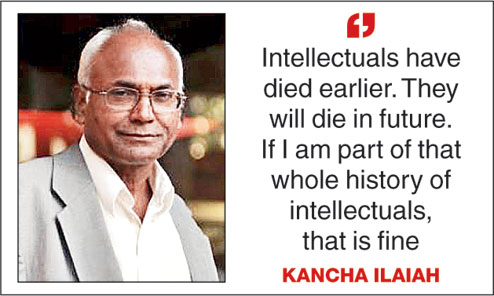
New Delhi, Oct. 4: Eminent academic Kancha Ilaiah today ended his fortnight-long voluntary "house arrest", saying he wouldn't let threats put him off his mission to spread English-medium education among socially underprivileged children and work for private sector reservation for the deprived sections.
"Hereafter, I will work with the people on the issues of English-medium schooling for children of SCs, STs and OBCs and for private sector reservation," the writer-professor said from Hyderabad.
"I don't want to be deterred," Ilaiah, author of books like Why I Am Not A Hindu and Post-Hindu India, told The Telegraph.
Scheduled Castes, Scheduled Tribes and the Other Backward Classes are entitled to reservation in government jobs and government-run higher education institutions, but not in the private sector.
Ilaiah had been under self-imposed house arrest since late last month after T.G. Venkatesh, an MP from the Telugu Desam Party that rules Andhra Pradesh, said he should be hanged publicly with legal sanction.
That was after a publisher had brought out the Telugu translation of each chapter of Post-Hindu India, written in the context of SC/STs and OBCs not getting reservation in the private sector.
One chapter, titled Social Smugglers, is on the Baniya community and says the Hindu religion sanctioned exclusive rights for some communities and exclusive duties for some. Baniyas, as an exclusive business caste, had discovered the method of hiding wealth underground known as guptadhana, Ilaiah says.
Venkatesh, a Baniya from the Arya Vysa community who had publicly warned Ilaiah, was not available for comment today. A personal aide who answered the call to his mobile said the MP would be available tomorrow morning.
Ilaiah, director of the Centre for the Study of Social Exclusion and Inclusive Policy at Hyderabad's Maulana Azad National Urdu University, said the Andhra and Telangana governments were both indifferent to his security after the public threat and the protests it stoked.
"Now the world has come to know about this issue. Intellectuals have died earlier. They will die in future. If I am part of that whole history of intellectuals, that is fine. Any human being loves one's life. I love my people more than my life," Ilaiah said.
He blasted the BJP too, saying the atmosphere in the country since the party swept to power at the Centre has been anti-intellectual.
The BJP has also been accused of not doing enough to protect Dalits, though the leadership has of late been reaching out to the community in a bid to draw it into the Hindu fold.
Ilaiah said the Congress-led UPA I government had mooted the idea of private sector reservation but private industry had rejected the suggestion.
Ilaiah said the ground for rejecting calls for private sector reservation for SC/STs and OBCs did not have merit. "These people are producers of the wealth of the nation and their children are not given opportunity to learn anything," he said.
The academic, who has been working for the cause of the marginalised sections, cited an article - Blocked by Caste? Corporate Boards in India, published in the Economic and Political Weekly in 2012 by economists D. Ajit, Han Donkar and Ravi Saxena - to point out that private sector industry was under the control of Brahmins and Baniyas.
According to that article, he said, 46 per cent of company directors were Baniyas and 44.6 per cent were Brahmins, while the socially underprivileged sections, including the OBCs and SC/STs, accounted for just about 7 per cent.
SCs and STs make up around 25 per cent of the country's population. OBCs accounted for 52 per cent of the population, according to a census in the 1930s. The findings of the latest 2011 caste census have not been published yet.
Ilaiah said Brahmins and Baniyas dominated faculty positions at universities and claimed that hundreds of posts meant for the deprived sections were deliberately kept vacant. He said candidates from the deprived sections who fulfilled the basic criteria should be appointed.
The only problem with SC/ST and OBC children was their weak English, he said, adding that there should be more state-supported English-medium schools for them.
Ilaiah said he didn't think the Narendra Modi government's move to set up a commission for sub-categorisation of OBCs would help in distributing quota benefits better.
"What is the use of categorisation when there is no job in the government sector?" he said, referring to the move to split the existing 27 per cent quota for OBCs among specific communities, based on their proportionate population.
"They are not going to extend it to the private sector," he added. "Let the Modi government take the initiative to reopen (the issue of) private sector reservation."










